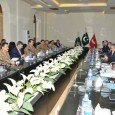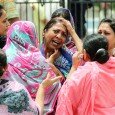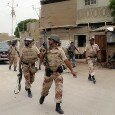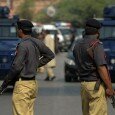By Rahimullah Yusufzai –
Using force against militants is the eventual option
After months of failed efforts to strike a conversation with the Pakistani Taliban, Prime Minister Nawaz Sharif’s government has conceded that it doesn’t possess the key that could open the door to its proposed peace talks with the militants.
The belated realization by the government of the enormity of the task has come at a time when the militants have dramatically increased their attacks on the security and law-enforcement forces and resorted in a big way to target-killings. The security forces suffered the most casualties in the latest round of terrorist attacks with one incident on January 19 in Bannu claiming the lives of 26 personnel of the Pakistan Army and the paramilitary Frontier Corps as they prepared to depart for deployment in North Waziristan. This was the second biggest loss suffered by Pakistani soldiers in an incident in the more than decade-old conflict in the Federally Administered Tribal Areas (Fata) and Khyber Pakhtunkhwa province.
The single biggest loss experienced by the Pakistani security forces in the conflict was on November 7, 2006 when 42 recruits were killed in a suicide bombing at the parade ground outside the Dargai Fort in Malakand Agency. That was among the earliest and major suicide bombings in Pakistan and was carried out to avenge the US drone strike that killed 83 students at a madrassa in Bajaur’s Damadola village. The army was targeted because the then President and Army chief General Pervez Musharraf had wrongly and arrogantly claimed that the air strike on the seminary was conducted by the Pakistani military.
To further show their dangerous intent, the militants struck again on January 20 at the R. A Bazaar not far from the Pakistan Army’s general headquarters in Rawalpindi, killing seven soldiers and seven civilians. The army was the obvious target once more, but civilians continued to suffer ‘collateral damage’ because military installations and civilian localities due to the rapidly growing population are increasingly situated close to each other.
Known senior cop Chaudhry Aslam, who spearheaded the hunt for militants and criminals in Karachi, was target-killed in a precise suicide bombing that turned his bullet-proof vehicle into pieces. Amir Muqam, an adviser to the Prime Minister and senior vice-president of the ruling Pakistan Muslim League-Nawaz (PML-N), was lucky to survive a roadside bomb blast in his native Shangla district in which three of his aides and three policemen were killed. It was the sixth attempt on the life of Amir Muqam, who is vocal in criticizing the militants.
Sectarian attacks also continued in parts of the country. One such attempt by Lashkar-i-Jhangvi, a proscribed Sunni extremist group linked to the TTP, to blow up a government high school in the Shia-populated Ibrahimzai village in Hangu district was foiled by a courageous 15-year old student, Aitzaz Hassan, who laid down his life while grappling with the teenager suicide bomber to prevent him from entering the school.
The Peshawar headquarters of the Tableeghi Jamaat, the apolitical organization of Muslim preachers, was attacked recently during the evening Maghrib prayers when the congregation had swelled up for the weekly “Shab-i-Juma” session on Thursday-Friday night. Nine innocent persons were martyred while offering prayers and more than 60 were injured. The death toll would have been much higher had the two remaining explosive devices not been found and defused in time.
Apart from other reasons, two factors in particular seem to have caused the spike in terrorist attacks. One could be the growing belief among the militants that the military was preparing to launch an operation against them in parts of North Waziristan and, therefore, the outlawed Tehrik-i-Taliban Pakistan (TTP) has undertaken pre-emptive attacks. The militants believe the troops were being deployed and reinforced in time for undertaking action against their hideouts. Another reason could be the retaliatory attack by the security forces in the Mir Ali area in North Waziristan on November 23 in which dozens of civilians were killed and injured following a suicide bombing that targeted the security checkpoint at Khajuri near Mir Ali town and caused the death of a soldier and an army contractor and injuries to several other troops. The militants have been trying to exploit the issue of civilian casualties to gain public support by publicizing the deaths of women, children and common people and destruction of houses, markets and a mosque in Mir Ali due to the shelling by the army artillery and mortar guns and strafing by gunship helicopters.
In keeping with the army’s changed strategy of hitting back in case of an attack on the security forces by the militants, the troops again resorted to retaliatory strikes in the Mir Ali area in North Waziristan on January 21 and initial reports said 23 persons were killed. New army chief General Raheel Sharif had made it obvious that his men would retaliate if attacked and this now seems to be the standard practice in such situations. However, indiscriminate use of force, including gunship helicopters and long-range artillery shelling, in populated areas without proper intelligence about militants’ hideouts could do more harm than good and turn the affected people against the army and the government. The militants are often able to make good their escape and the civilians are left to bear the brunt of the army’s firepower.
The dramatic increase in terrorist attacks could be interpreted as the TTP’s disinterest in holding peace talks despite repeated offers by the Nawaz Sharif government. The government too made a mess of it by assigning the task of approaching the militants for talks to several, often antagonistic, facilitators and peacemakers. The TTP too made an offer of talks recently on the condition that the government provided evidence of its sincerity and authority to undertake such an initiative in the face of the military’s apparent reluctance for the undertaking. However, the TTP’s belated offer of talks made no sense as it continued to launch terrorist attacks across the country. In fact, the TTP too needed to show its sincerity for talks because a pause in its attacks, or preferably a ceasefire, was needed to create the right conditions for any peace dialogue. By resorting to brutal attacks, mostly aimed at the security forces and the police, the militants were forcing the government’s hand and it seems the circumstances are leading towards a full-blown conflict in North Waziristan.
Prime Minister Nawaz Sharif, who had put too much faith in a peaceful and negotiated solution of the conflict after winning the May 2013 general election, has been forced to rethink the government’s policy. Conceding that the security situation was critical, he told a meeting of the federal cabinet that extraordinary measures would be taken to deal with it after taking the politicians into confidence. The cabinet also tried to fast-track the approval of the internal security policy that has been in the works for months.
Under pressure from all sides due to its slow and sometimes confusing decision-making on tackling the issue of terrorism, it finally appeared that the government had realized the gravity of the situation. The ‘extraordinary’ measures promised by the Prime Minister haven’t been spelled out yet, but it seemed the government’s peace initiative was falling apart amid the growing demand for taking a firm action against the militants, particularly in North Waziristan.
It is possible that the government would continue to highlight its abiding interest in holding peace dialogue with the militants, but it would be mostly talk about talks as the trust deficit between the two sides is too wide to be easily bridged. Correspondingly though, a limited and targetted military action could be undertaken against the TTP cells in North Waziristan and elsewhere. However, it would be a challenge to keep the action limited and controlled because the conflict could spread and engulf more militant groups and areas.
The writer is a senior journalist based in Peshawar






























































































